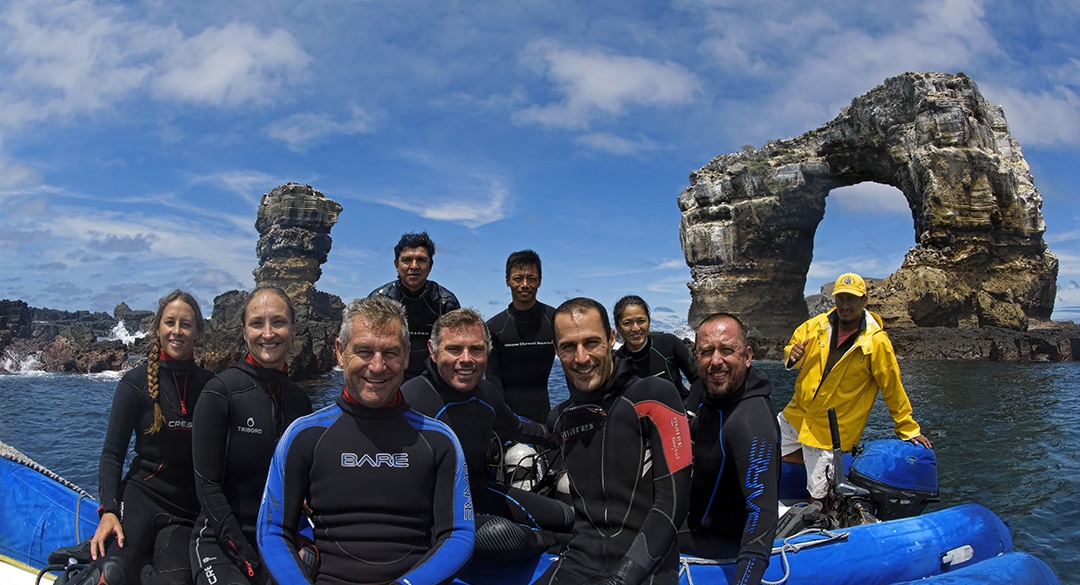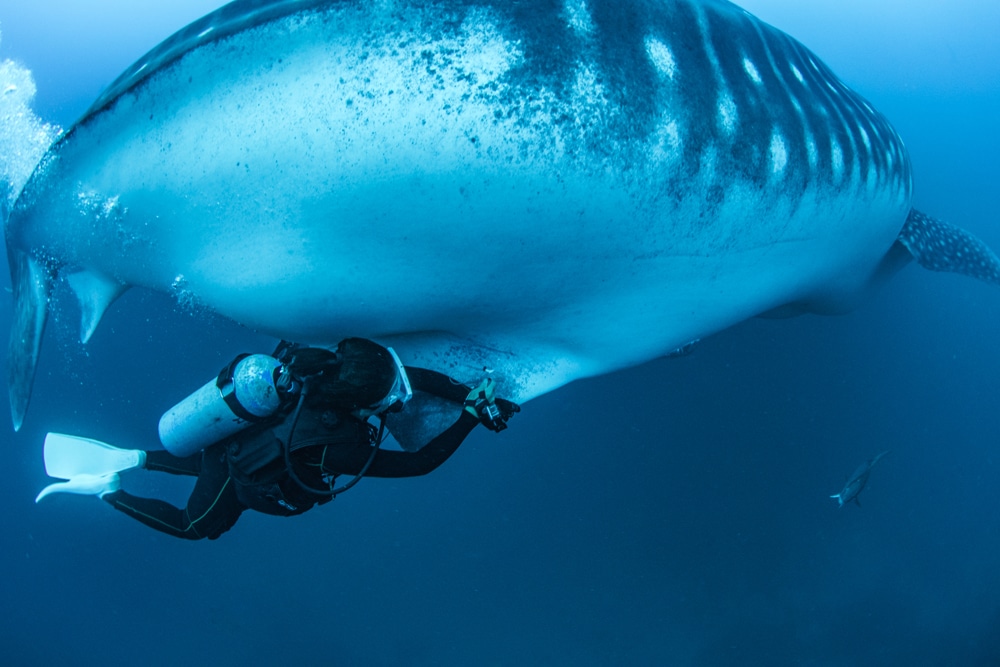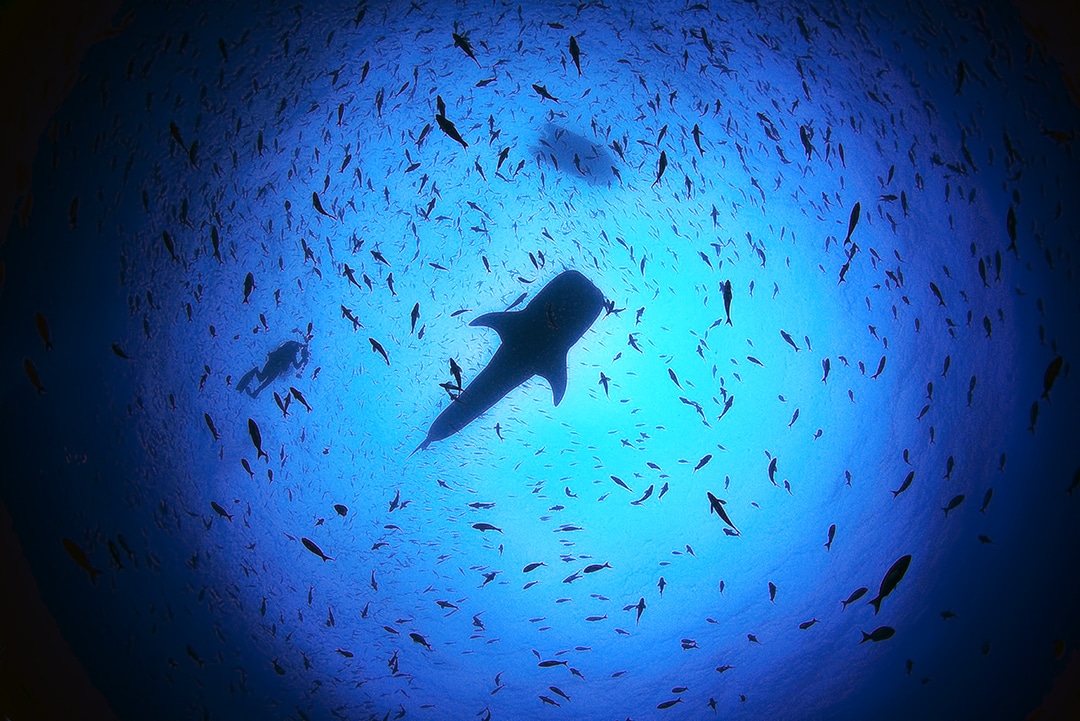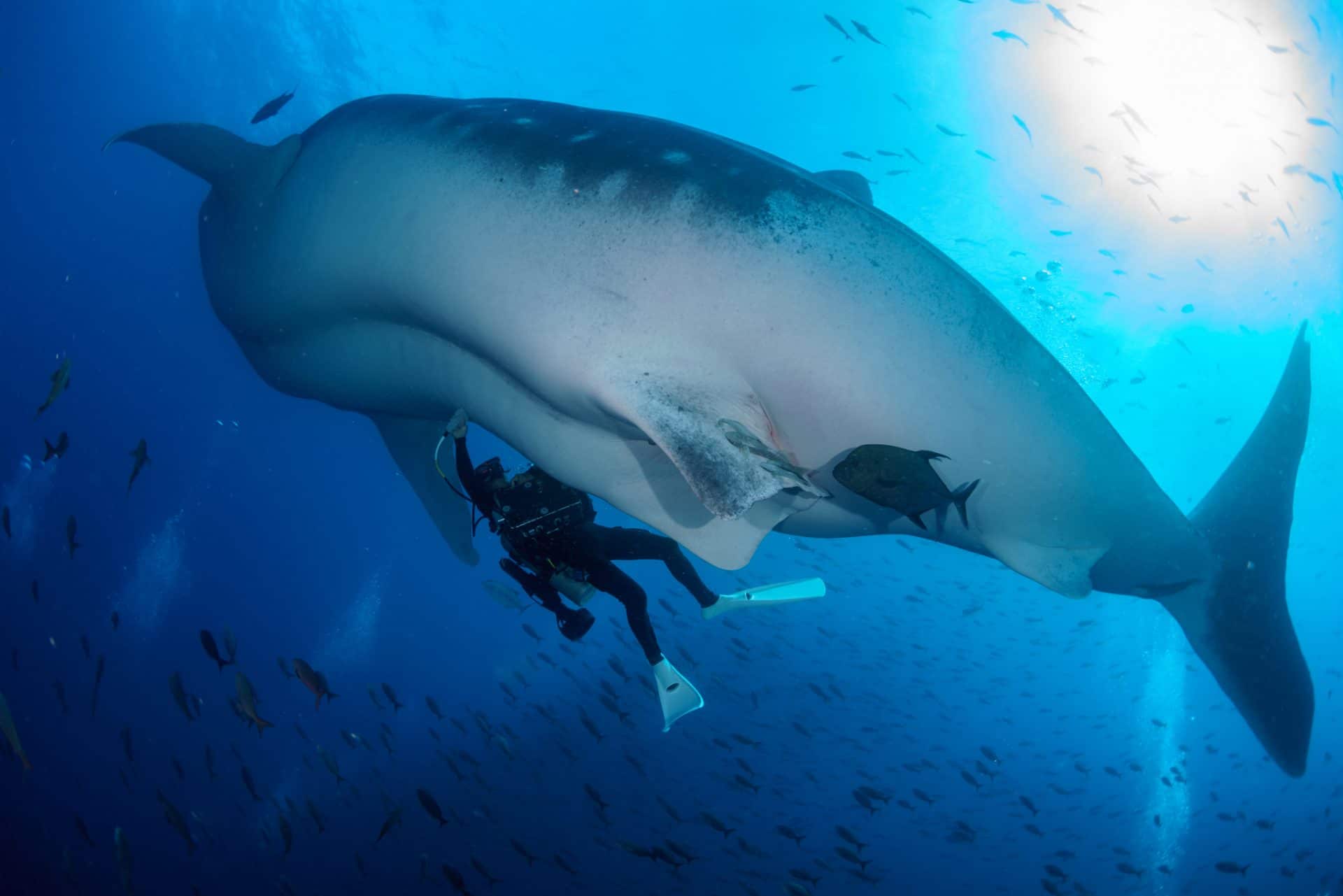Marine Life & Conservation
Underwater ultrasound & first ever blood sampling on adult Whale Sharks

 Innovative techniques used on whale sharks in the Galapagos to find out more about their reproduction
Innovative techniques used on whale sharks in the Galapagos to find out more about their reproduction
Researchers in the Galapagos have successfully completed ultrasounds on free-swimming whale sharks, and taken blood samples from adult whale sharks for the first time ever in the wild. The incredible results allowed them to see and identify reproductive organs, such as the ovaries, and even developing follicles. These technologies hold promise for finally unlocking the mystery of breeding in the world’s largest sharks.
A team of global whale shark experts, comprised of scientists and conservationists from the Galapagos Whale Shark Project (Ecuador), Galapagos National Park (Ecuador), Okinawa Churashima Foundation (Japan), University of San Francisco/Galapagos Science Center (Ecuador) and the Marine Megafauna Foundation (USA), has just returned from a two-week expedition to Darwin Island, in the far north of the Galapagos Archipelago.
This remote volcanic island is one of the few places where huge adult female whale sharks, up to 14 m (45 ft) in length, are commonly seen each year. The main aim of the expedition was to assess the sharks’ reproductive state.
Jonathan R. Green, the expedition leader and founder of the Galapagos Whale Shark Project, notes: “Almost nothing is known about the reproduction of these giant sharks. After I first saw these huge female whale sharks in the far north Galapagos, I realised that this was a great opportunity to learn more. We’ve been able to put together an experienced team to research sharks in this remote area, one of the world’s most isolated dive sites.”
Dr Simon Pierce, an expedition member from the Marine Megafauna Foundation, explains further: “Whale shark breeding is a mystery. Only one pregnant shark has been physically examined so far, back in 1995 in Taiwan. That ‘megamamma’ shark had 304 little whale shark eggs and pups inside, all less than 60 cm in length.”
The team conducted scans using a 17 kg ultrasound system in a waterproofed case. Whale sharks have tough protective skin, more than 20 cm thick on some individuals, so the 30 cm penetration of the ultrasound waves proved a challenge – not to mention the difficulty of carefully checking the whole belly area of a gigantic shark while it is swimming. Dr Matsumoto had to use a propellor system mounted on his air-tank to keep up with the sharks.
“We use some interesting technology anyway, but working with the Okinawa team was something else”, commented Dr Pierce. “I felt cool by association. We saw dive groups a couple of times at the site, and I can only imagine what they thought – why is that guy diving with a briefcase? And a jetpack?”
Dr Matsumoto reports that the initial results were promising: “We confirmed the presence of follicles in the ovaries but none of the images captured embryos or egg capsules inside the uterus. These adult female sharks we saw at Darwin Island might be on their way to mate further offshore. I am confident that we can judge the sexual maturity, and probably also determine the pregnancy of whale sharks in the field, using the underwater ultrasound”.
The researchers attached satellite-linked tags to the sharks to track their onwards movements. Professor Alex Hearn from the University of San Francisco/Galapagos Science Center explains: “We’ve tagged whale sharks in Galapagos before, but there are lots of predatory sharks at Darwin and they often try to eat the tags, which can rip them out of the whale sharks almost immediately. To reduce early tag loss, we tried a different method on this trip, clamping the tags to the tip of the dorsal fins. All tags are transmitting well, so we should get great information on where these sharks swim over the months to come.”
Project member Dr Alistair Dove, from Georgia Aquarium, notes that these tags could document some amazing behaviours: “Whale sharks are already known to be the deepest-diving of all fish. The current depth record is 1,928 m – well over a mile – set by a juvenile whale shark. Larger, older animals can generally dive deeper than young smaller ones, so perhaps we will challenge that record.”
Kiyomi Murakumo, from Okinawa Churashima Foundation, successfully collected blood samples from six adult sharks – no easy job. Her colleague, Dr Ryo Nozu, analyzed the results immediately following the trip: “Sex steroid hormone levels in the blood are an excellent way to monitor reproduction in individual sharks. This study measured levels of estradiol, progesterone and testosterone of wild, adult female whale sharks for the first time in the world. Estradiol could be associated with follicular development, and progesterone could be involved in ovulation and pregnancy. Over time, as we sample more whale sharks, we can build up a complete picture of their reproductive cycle by combining the blood sampling with the ultrasonography.”
Jonathan R. Green added: “These big female sharks are not going to give up their secrets easily. One thing is clear: there’s a lot of work still to do to understand the reproductive processes of this endangered species. However, this trip proved that it is possible to research their breeding in the wild. We’ll continue to hone our techniques and build upon this knowledge, as we need to understand these enigmatic sharks and protect them through their life cycle.”
This project was supported by Galapagos Conservation Trust, Planeterra Foundation and Temperatio.
Photo Credit: GWSP page – www.
For more information about the Marine Megafauna Foundation please visit their website by clicking here.
Marine Life & Conservation
Double Bubble for Basking Sharks

 The Shark Trust is excited to announce that, for two more days only, all donations, large or small, will be doubled in the Big Give Green Match Fund!
The Shark Trust is excited to announce that, for two more days only, all donations, large or small, will be doubled in the Big Give Green Match Fund!
Donate to Basking in Nature: Sighting Giants
The Shark Trust is hoping to raise £10k which will be doubled to £20k. This will go towards Basking in Nature: Sighting Giants. And they need YOUR help to reach they’re goal.
The Shark Trust’s citizen science project is to monitor and assess basking sharks through sightings; encouraging data collection, community engagement, and promoting nature accessibility. This initiative aims to enhance health and wellbeing by fostering a deeper connection with British Sharks.
Campaign Aims
- Increase citizen science reporting of Basking Sharks and other shark sightings to help inform shark and ray conservation.
- Provide educational talks about the diverse range of sharks and rays in British waters and accessible identification guides!
- Create engaging and fun information panels on how to ID the amazing sharks and rays we have on our doorstep! These can be used on coastal paths around the Southwest. With activities and information on how you can make a difference for sharks and rays!
- Promote mental wellbeing through increasing time in nature and discovering the wonders beneath the waves!
Donate, and double your impact. Click Here
Marine Life & Conservation
Leading UK-based shark conservation charity, the Shark Trust, is delighted to announce tour operator Diverse Travel as a Corporate Patron

 Corporate Patrons provide a valuable boost to the work of The Shark Trust. The Trust team works globally to safeguard the future of sharks, and their close cousins, the skates and rays, engaging with a global network of scientists, policymakers, conservation professionals, businesses and supporters to further shark conservation.
Corporate Patrons provide a valuable boost to the work of The Shark Trust. The Trust team works globally to safeguard the future of sharks, and their close cousins, the skates and rays, engaging with a global network of scientists, policymakers, conservation professionals, businesses and supporters to further shark conservation.
Specialist tour operator Diverse Travel has operated since 2014 and is committed to offering its guests high quality, sustainable scuba diving holidays worldwide. Working together with the Shark Trust will enable both organisations to widen engagement and encourage divers and snorkellers to actively get involved in shark conservation.
“Sharks are truly at the heart of every diver and at Diverse Travel, we absolutely share that passion. There is nothing like seeing a shark in the wild – it’s a moment that stays with you forever!” says Holly Bredin, Sales & Marketing Manager, Diverse Travel.
“We’re delighted to celebrate our 10th year of business by becoming a Corporate Patron of the Shark Trust. This is an exciting partnership for Diverse and our guests. We will be donating on behalf of every person who books a holiday with us to contribute towards their vital shark conservation initiatives around the world. We will also be working together with the Trust to inspire divers, snorkellers and other travellers to take an active role – at home and abroad – in citizen science projects and other activities.”
Paul Cox, CEO of The Shark Trust, said:
“It’s an exciting partnership and we’re thrilled to be working with Diverse Travel to enable more divers and travellers to get involved with sharks and shark conservation. Sharks face considerable conservation challenges but, through collaboration and collective action, we can secure a brighter future for sharks and their ocean home. This new partnership takes us one more valuable step towards that goal.”
For more information about the Shark Trust visit their website here.
For more about Diverse Travel click here.
-

 News3 months ago
News3 months agoHone your underwater photography skills with Alphamarine Photography at Red Sea Diving Safari in March
-

 News3 months ago
News3 months agoCapturing Critters in Lembeh Underwater Photography Workshop 2024: Event Roundup
-

 Marine Life & Conservation Blogs2 months ago
Marine Life & Conservation Blogs2 months agoCreature Feature: Swell Sharks
-

 Blogs2 months ago
Blogs2 months agoMurex Resorts: Passport to Paradise!
-

 Blogs2 months ago
Blogs2 months agoDiver Discovering Whale Skeletons Beneath Ice Judged World’s Best Underwater Photograph
-

 Marine Life & Conservation2 months ago
Marine Life & Conservation2 months agoSave the Manatee Club launches brand new webcams at Silver Springs State Park, Florida
-

 Gear Reviews3 months ago
Gear Reviews3 months agoGear Review: Oceanic+ Dive Housing for iPhone
-

 Gear Reviews2 weeks ago
Gear Reviews2 weeks agoGEAR REVIEW – Revolutionising Diving Comfort: The Sharkskin T2 Chillproof Suit









